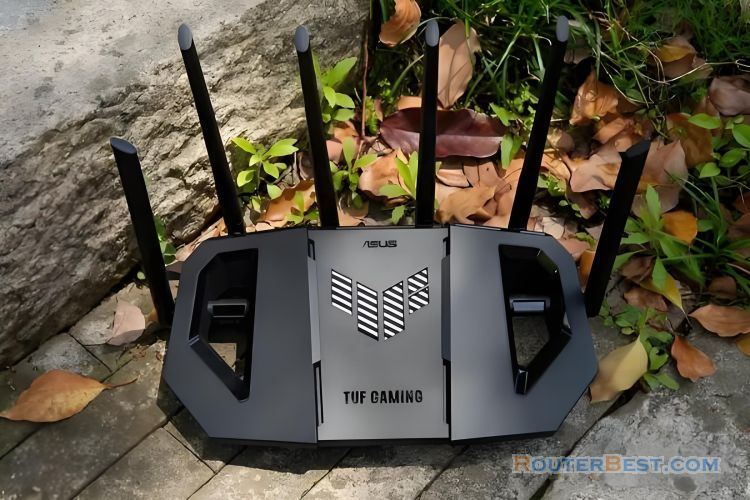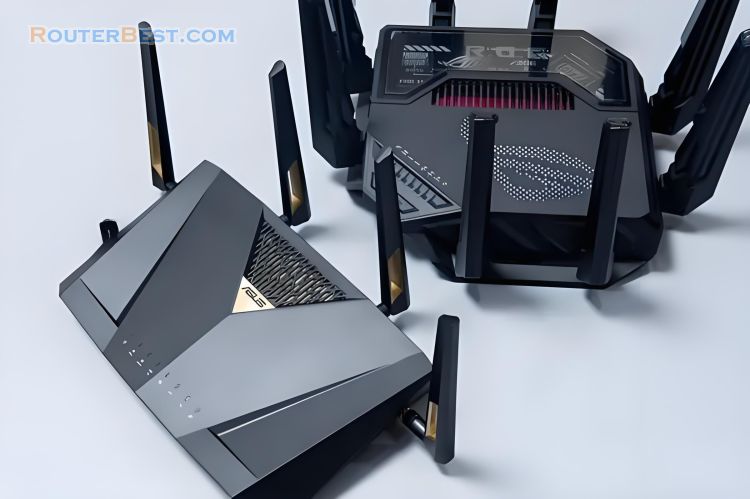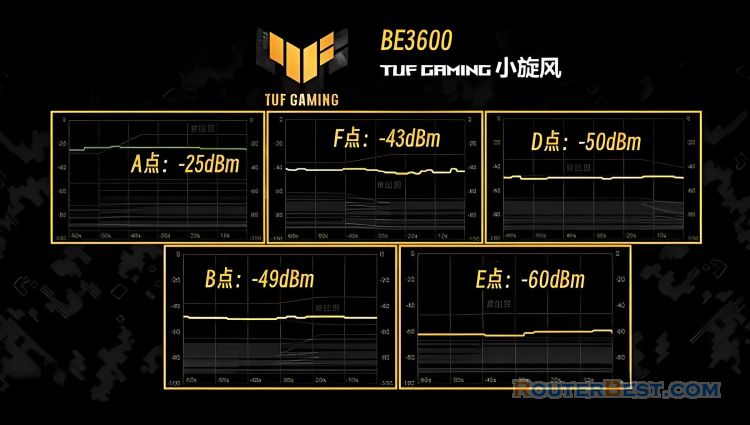As of now, ASUS has released four Wi-Fi 7 routers, covering entry-level, mainstream, high-end, and flagship models. During the 618 shopping festival in 2024, many are debating whether to go for the more affordable Wi-Fi 6 routers or invest in the future-proof Wi-Fi 7 models.
In this guide, I'll break down the options based on CPU and RF chipsets and provide recommendations based on real-world tests. To save you time, I won't dive into the technical details of Wi-Fi 7.
Qualcomm IPQ5332 (Mainstream)
BE6500

The BE6500, also known as the TUF Gaming Pro, uses the Qualcomm IPQ5332 CPU. This is a popular choice for many mainstream BE6500 routers. The IPQ5332 is a quad-core A53 CPU running at 1.5GHz, with integrated 2.4GHz RF supporting 2x2 MIMO at a max speed of 688Mbps (4KQAM). For 5GHz, it pairs with the QCN6224 RF chip for a top speed of 2882Mbps. The BE6500 thus combines 688Mbps (2.4GHz) and 5765Mbps (5GHz) with six antennas for 4x4 (5GHz) and 2x2 (2.4GHz).
On the Ethernet side, the IPQ5332 supports 2 USXGMII interfaces (5G+10G), and with an external QCA8386 4-port 2.5G PHY chip, the BE6500 offers four 2.5G ports. Note, however, that the maximum bandwidth for the 4 ports is only 5Gbps due to the IPQ5332’s limitations.
Coverage and Speed
The BE6500 performs excellently in coverage, maintaining a solid signal across a 100-square-meter area. Paired with a Qualcomm WCN7851 Wi-Fi chip, it achieves impressive speeds, even at -45dBm signal strength, with down/up speeds of 1.70/1.38Gbps.
Recommendation
The BE6500 is my top recommendation among ASUS Wi-Fi 7 routers due to its balanced price and performance. It’s suitable for most users. Compared to the TUF AX6000, the BE6500 has slightly better wireless performance and similar wired performance, albeit at a higher price.
Broadcom BCM4916 (High-End)
BE88U and BE96 (Octopus 7)

Both the BE88U and BE96 (Octopus 7) use the high-end Broadcom BCM4916 CPU. This quad-core, ARMv8 CPU runs at 2.6GHz, with 64KB L1 cache and 1MB L2 cache, delivering up to 24K DMIPS of processing power. It supports all Wi-Fi 7 features and has robust Ethernet capabilities, including integrated 10Gb and four 1Gb ports, plus three USXGMII (10Gb) ports.
The BE96 (Octopus 7) is ASUS’s flagship Wi-Fi 7 router, supporting tri-band Wi-Fi and dual 10Gb wired connections, using three BCM6726 RF chips and various FEM chips for high performance. The BE88U is a dual-band version with enhanced wired connectivity, featuring 10 ports (1x 10Gb fiber, 1x 10Gb Ethernet, 4x 2.5G Ethernet, and 4x 1G Ethernet).
Coverage and Speed
Both routers excel in coverage and speed, with the best overall coverage I’ve tested. However, the signal strength is only slightly better than other top models, and achieving maximum speeds can be challenging in real-world conditions.
Recommendation
For those wanting the best, the BE96 offers unmatched performance and extra features for ROG enthusiasts. The BE88U is the best choice at around ¥1700, offering strong wireless and exceptional wired performance. If Wi-Fi 7 isn’t a must-have, consider the AX86U Pro or wait for the Wi-Fi 7 version, BE86U.
Broadcom BCM6764L (Entry-Level)
BE3600

The entry-level BE3600 uses the new Broadcom BCM6764L chip, likely an upgrade from the BCM6756. It runs at 2GHz and integrates 2.4GHz RF, similar to the Qualcomm IPQ5332. The BE3600 offers four 1G Ethernet ports and one 2.5G port.
Coverage and Speed
The BE3600 performs well but is slightly behind the BE6500 in 5GHz coverage, with about 3dB less signal strength. It covers 98% of a 100-square-meter area within the ideal -60dBm range. Speed tests showed some variability, but overall, it performs well in the -50 to -40dBm range.
Recommendation
The BE3600 is a solid choice for those looking for strong wireless performance and a compact design, ideal as a MESH node. ASUS excels in MESH networking, providing a smooth combination of Wi-Fi 7 and Wi-Fi 6.
Facebook: https://www.facebook.com/routerbest
Twitter: https://twitter.com/routerbestcom
